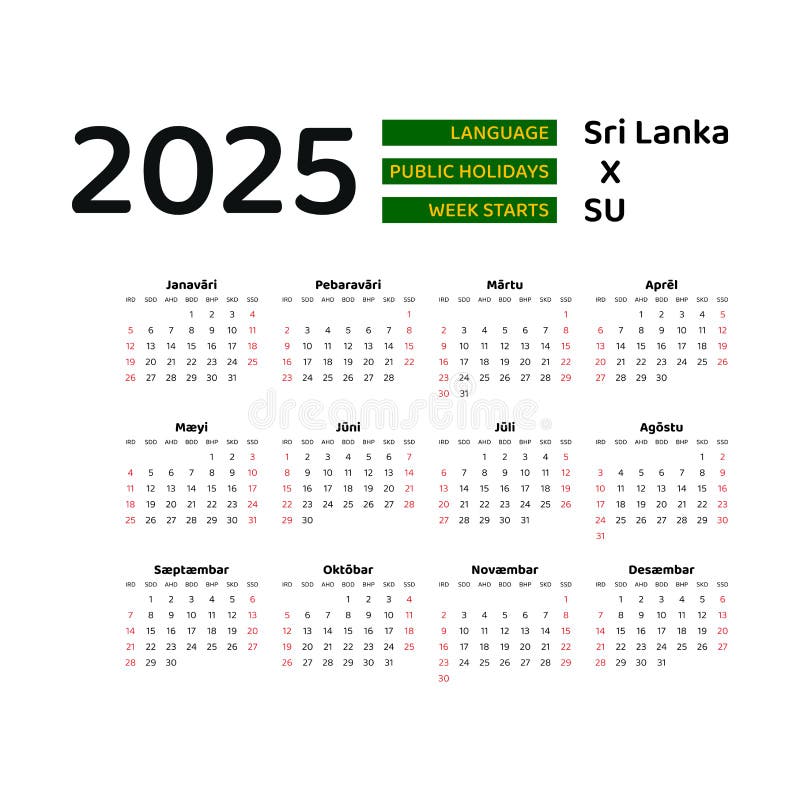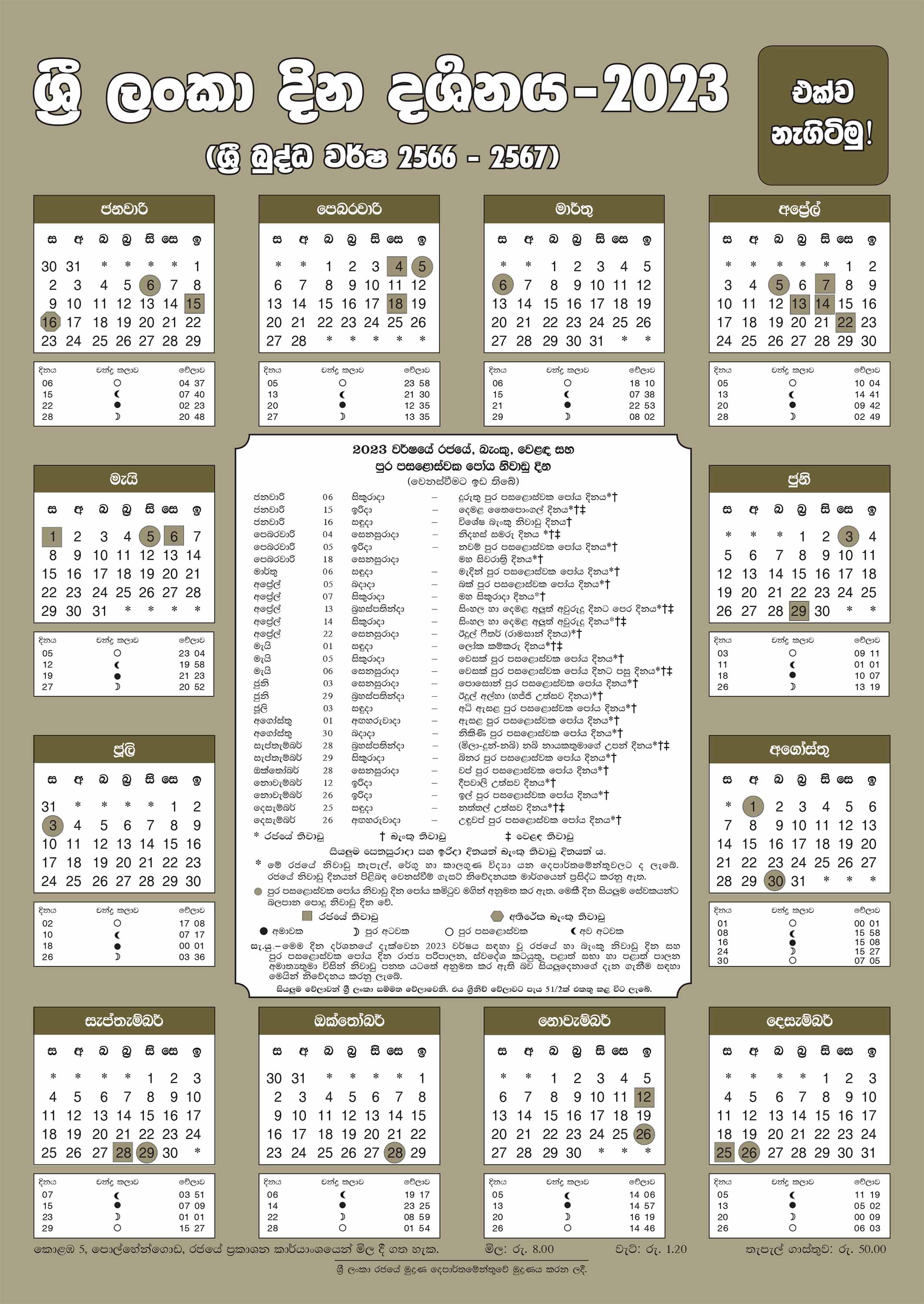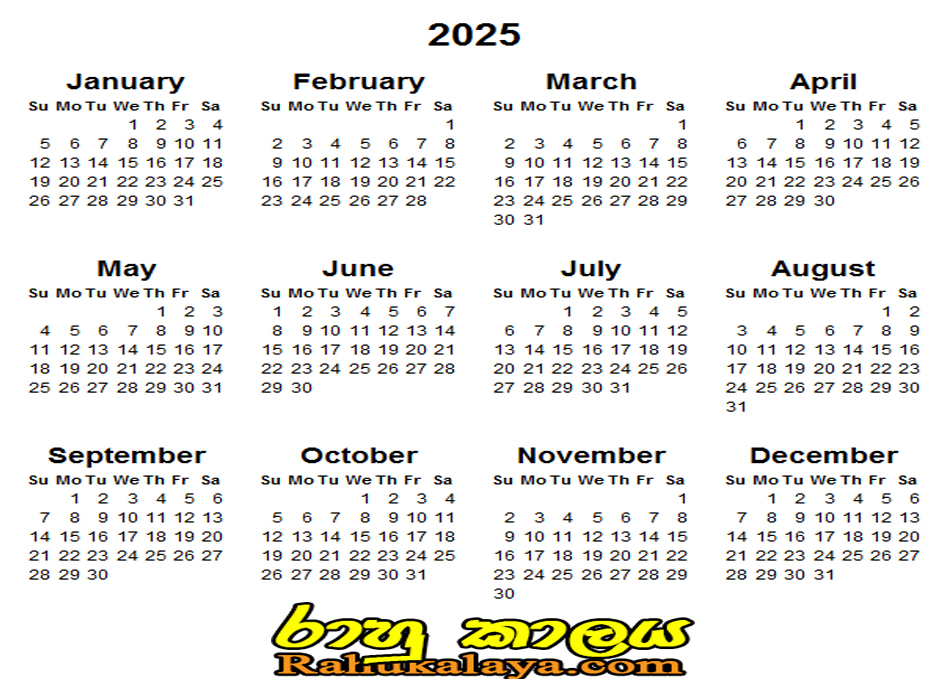A Comprehensive Guide to Sri Lankan Public Holidays in 2025
Related Articles: A Comprehensive Guide to Sri Lankan Public Holidays in 2025
Introduction
With great pleasure, we will explore the intriguing topic related to A Comprehensive Guide to Sri Lankan Public Holidays in 2025. Let’s weave interesting information and offer fresh perspectives to the readers.
Table of Content
A Comprehensive Guide to Sri Lankan Public Holidays in 2025

Sri Lanka, an island nation renowned for its diverse culture and breathtaking landscapes, also boasts a vibrant calendar of public holidays. These holidays, rooted in religious observances, historical events, and cultural celebrations, provide opportunities for reflection, rejuvenation, and shared experiences. Understanding the Sri Lankan public holiday calendar offers valuable insights into the country’s rich tapestry of traditions and allows individuals and businesses to plan accordingly.
2025: A Year of Festivities and Observances
The year 2025 promises a diverse range of public holidays in Sri Lanka, catering to various religious and cultural traditions. This comprehensive guide provides a detailed overview of these holidays, highlighting their significance and offering practical tips for planning.
January
- New Year’s Day (January 1): Marking the beginning of the Gregorian calendar, this universal holiday is celebrated across the globe, including Sri Lanka. It offers a chance to reflect on the past year and embrace the promise of a new beginning.
February
- Tamil Thai Pongal (Date varies): This four-day harvest festival celebrated by the Tamil community honors the Sun God Surya and celebrates the bountiful harvest. The festival features traditional rituals, feasts, and vibrant cultural performances.
March
- Maha Shivarathri (Date varies): This significant Hindu festival commemorates the night of Lord Shiva’s cosmic dance, symbolizing the triumph of good over evil. Devotees observe fasts, perform special prayers, and engage in acts of charity.
April
-
Good Friday (Date varies): This Christian holiday commemorates the crucifixion of Jesus Christ, marking a solemn occasion for Christians worldwide. Churches hold special services, and many businesses observe a day of reflection and remembrance.
-
Easter Sunday (Date varies): Following Good Friday, Easter Sunday celebrates the resurrection of Jesus Christ, symbolizing hope, renewal, and victory over death. It is a joyous occasion marked by church services, family gatherings, and traditional Easter egg hunts.
-
Sinhala and Tamil New Year (Date varies): This significant cultural event marks the beginning of the traditional Sinhala and Tamil calendars. It is a time for family reunions, traditional feasts, and festivities that span several days.
May
- Vesak (Date varies): This Buddhist holiday commemorates the birth, enlightenment, and death of the Buddha, marking a profound event in Buddhist history. Buddhists observe this day with religious ceremonies, meditation, and acts of kindness.
June
- Poson Poya (Date varies): This Buddhist holiday commemorates the arrival of Buddhism in Sri Lanka, marking a pivotal moment in the island’s history. It is a time for reflection, meditation, and spiritual observances.
July
- Asoka (Date varies): This Buddhist holiday commemorates the visit of Emperor Asoka to Sri Lanka, spreading the teachings of Buddhism. It is a day for reflection on the importance of peace and non-violence.
August
- Independence Day (August 4): This national holiday commemorates Sri Lanka’s independence from British rule in 1948. It is a day of national pride and celebration, marked by parades, cultural events, and patriotic displays.
September
-
Binara Poya (Date varies): This Buddhist holiday commemorates the Buddha’s first sermon, marking the beginning of his teachings. It is a day for reflection on the principles of Buddhism and their importance in daily life.
-
Waxing Moon Poya (Date varies): This Buddhist holiday commemorates various significant events in the Buddha’s life, including his first miracle. It is a time for spiritual reflection and observance.
October
-
Full Moon Poya (Date varies): This Buddhist holiday marks the full moon and is associated with various significant events in the Buddha’s life, including his enlightenment. It is a day for meditation and reflection.
-
Deepavali (Date varies): This Hindu festival of lights celebrates the victory of good over evil and marks the return of Lord Rama to Ayodhya after his exile. It is a vibrant celebration featuring diyas (oil lamps), fireworks, and traditional sweets.
November
- Ill Full Moon Poya (Date varies): This Buddhist holiday commemorates the Buddha’s visit to Sri Lanka, marking a significant event in the island’s religious history. It is a day for reflection and spiritual observances.
December
- Christmas Day (December 25): This Christian holiday celebrates the birth of Jesus Christ, marking a joyful occasion for Christians worldwide. It is a time for family gatherings, festive decorations, and gift-giving.
Understanding the Importance of Public Holidays
Sri Lankan public holidays play a crucial role in preserving the country’s rich cultural heritage and fostering a sense of national identity. They provide opportunities for:
-
Religious Observance: Many public holidays are rooted in religious traditions, allowing individuals to participate in religious ceremonies, rituals, and celebrations.
-
Cultural Preservation: Public holidays help to keep cultural traditions alive, ensuring that future generations inherit and cherish their heritage.
-
National Unity: Public holidays provide a platform for fostering national unity and solidarity, promoting a sense of shared identity and belonging.
-
Economic Benefits: Public holidays stimulate tourism, retail sales, and other economic activities, contributing to the overall well-being of the nation.
-
Personal Reflection: Public holidays offer individuals a chance to step back from their daily routines, reflect on their lives, and connect with their families and communities.
FAQs
Q: What are the legal provisions regarding public holidays in Sri Lanka?
A: Public holidays in Sri Lanka are governed by the "Holidays Act, No. 24 of 1949." This legislation outlines the official public holidays and the legal implications of these days.
Q: Are all public holidays observed as working days?
A: While most public holidays are observed as non-working days, certain exceptions may apply depending on the specific holiday and the nature of the business. It is advisable to consult the relevant government notifications or seek advice from legal professionals for clarity.
Q: How do public holidays affect business operations?
A: Public holidays can significantly impact business operations, particularly in sectors like banking, retail, and tourism. Businesses need to plan their schedules, adjust staffing, and communicate any changes to customers to ensure smooth operations.
Q: What are the potential benefits of observing public holidays?
A: Observing public holidays offers numerous benefits, including increased employee morale, improved productivity, enhanced customer satisfaction, and a stronger sense of community engagement.
Tips for Planning Around Public Holidays
-
Stay Informed: Consult reliable sources like government websites and news publications to obtain accurate information about public holidays and their observance.
-
Plan Ahead: Factor in public holidays when scheduling events, meetings, or travel plans to avoid potential disruptions.
-
Communicate Clearly: Inform employees, clients, and customers about any changes to business operations due to public holidays.
-
Embrace the Festivities: Take advantage of public holidays to participate in cultural events, visit historical sites, or simply enjoy quality time with family and friends.
Conclusion
The Sri Lankan public holiday calendar is a vibrant tapestry reflecting the country’s rich cultural heritage and diverse religious traditions. Understanding these holidays offers valuable insights into the country’s history, beliefs, and way of life. By embracing these holidays, individuals and businesses can contribute to the preservation of Sri Lanka’s cultural legacy and foster a sense of national unity and pride. As the year 2025 unfolds, the Sri Lankan public holiday calendar promises a year of celebrations, reflections, and opportunities for shared experiences.







Closure
Thus, we hope this article has provided valuable insights into A Comprehensive Guide to Sri Lankan Public Holidays in 2025. We thank you for taking the time to read this article. See you in our next article!